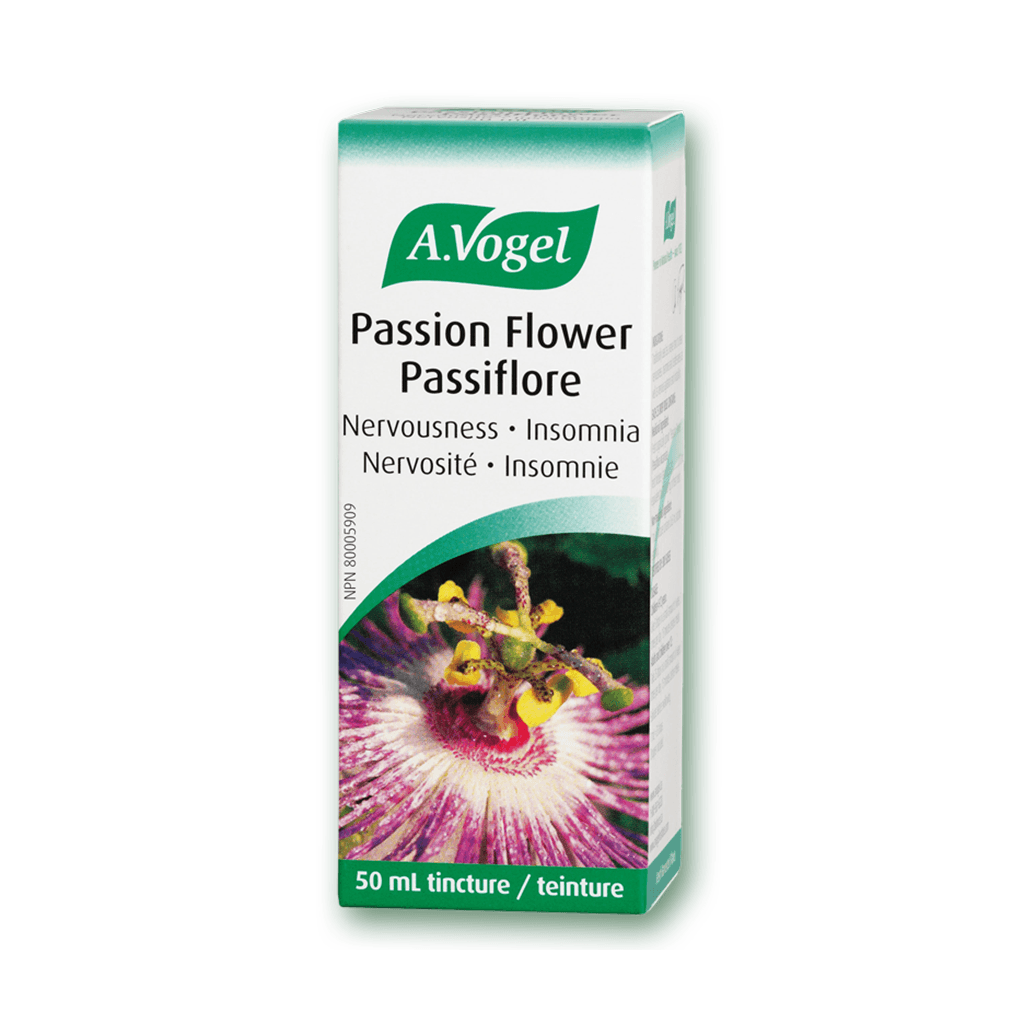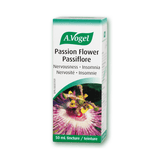

Passionflower Tincture
- 23.99$
- 23.99$
- Price per unit
- by
Irritability? Periods of stress?
A.Vogel® Passionflower is a recognized nerve tonic. Recommended for adults and children to treat nervousness, insomnia, agitation and irritability.
Traditionally used as a nerve tonic to treat nervousness, insomnia, irritability and restlessness.
Historical overview:
Native to America, passionflower owes its name to the resemblance between its flower and Christ's crown of thorns. It was exported by the first Spaniards and quickly spread to all warm climates. Passionflower was known for its sedative, hypnotic, antispasmodic and "anodynic" (today we would say "analgesic") properties. It was traditionally used for neuralgia, convulsions, tachycardia, insomnia and hysteria.
Actions and pharmacology :
Passionflower's main chemical constituents are alkaloids (harmane, harmaline, harmanine, etc.), flavonoids (vitexine, apigenine, luteolin, quercetine, etc.), maltol and ethylmaltol, sterols, etc.
Cyanogenic molecules (forming cyanide under certain conditions) have been discovered in passionflower. These molecules have only been identified in certain varieties such as Passiflora biflora, P. talamancensis, etc., but never in Passiflora incarnata(3).
The flavonoid apigenin binds to GABA receptors, which could explain some of passionflower's anxiolytic effect. Harman alkaloids are said to have an inhibitory effect on monoamine oxidase, suggesting an anxiolytic effect. stimulant effect reducing stress, anxiety, melancholy and mood disorders. Maltol and ethylmaltol are said to have a sedative and anticonvulsant effect. However, these molecules are present in insufficient quantities to validate these effects.(5) Passionflower's efficacy on anxiety and nervousness, like that of many other plants, is therefore explained by the synergy of its components.
The German Commission E recognizes the use of passionflower for nervous agitation(4).
Scientific studies :
A placebo-controlled clinical study on 182 patients evaluated the efficacy of a combination of medicinal plants containing passionflower. Results showed a significant effect on anxiety (according to the Hamilton Anxiety Scale)(6).
In an in vivo study, passionflower demonstrated an anxiolytic and sedative effect, as well as a potentiating action on sleeping pills given in sub-therapeutic doses(7).
Each dose of 25 drops contains :
- Tincture of fresh organically grown passionflower (Passiflora incarnata) herb* (ratio 1:2.5-2.7) ... 0.76 mL, equivalent to 279-308 mg fresh herb
1 mL tincture contains 0.65 mL alcohol (ethanol). *Certified by Bio Suisse.
1 mL = 33 drops. Dropper included.
Children aged 4 to 12: give 5 drops in a little water, 3 times a day, 15 minutes before meals.
Adults and children over 12: take 25 drops in a little water, 3 times a day, 15 minutes before meals.
Swallow before swallowing.
Consult a healthcare professional before use if you are taking medication to treat the same condition, or if symptoms persist or recur periodically.
- Avoid during pregnancy or breast-feeding.
- Avoid in case of known allergy to product ingredients.
- Do not use if safety cap is broken. Keep out of reach of children.
Related products
- 23.99$
- 23.99$
- Price per unit
- by
- 23.99$
- 23.99$
- Price per unit
- by
- 23.99$
- 23.99$
- Price per unit
- by
- 23.99$
- 23.99$
- Price per unit
- by
- 23.99$
- 23.99$
- Price per unit
- by
- 23.99$
- 23.99$
- Price per unit
- by
- 23.99$
- 23.99$
- Price per unit
- by
- 23.99$
- 23.99$
- Price per unit
- by
- 23.99$
- 23.99$
- Price per unit
- by
- 23.99$
- 23.99$
- Price per unit
- by
Recently viewed products
- 23.99$
- 23.99$
- Price per unit
- by
- 23.99$
- 23.99$
- Price per unit
- by
- 23.99$
- 23.99$
- Price per unit
- by
- 23.99$
- 23.99$
- Price per unit
- by
- 23.99$
- 23.99$
- Price per unit
- by
- 23.99$
- 23.99$
- Price per unit
- by
- 23.99$
- 23.99$
- Price per unit
- by
- 23.99$
- 23.99$
- Price per unit
- by
- 23.99$
- 23.99$
- Price per unit
- by
- 23.99$
- 23.99$
- Price per unit
- by
- Choosing a selection causes the entire page to be updated.


